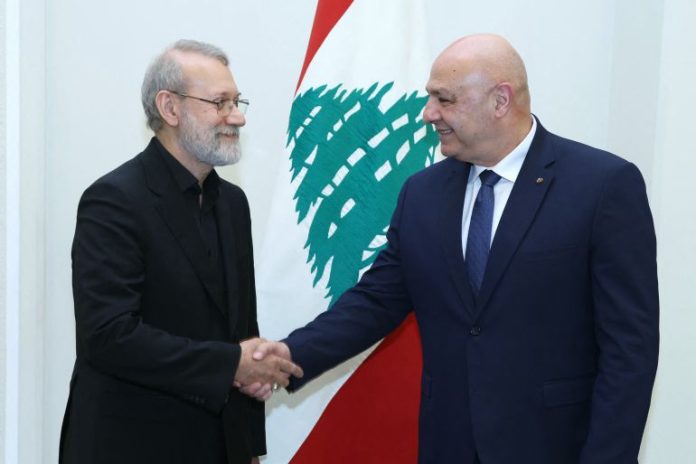Lebanon will not allow any external forces to interfere in its internal affairs, President Joseph Aoun said on Wednesday during a meeting with Ali Larijani, secretary of Iran’s Supreme National Security Council.
Larijani said Tehran would continue to support Lebanon, days after the Lebanese government ordered the army to draw up a plan to disarm the pro-Iranian Hezbollah group. Larijani rejected the disarmament plan and vowed that Iran would “stand by the Lebanese people.”
“If the Lebanese people suffer, we in Iran will also feel this pain and will support the people of Lebanon under any circumstances,” he told reporters after arriving in Beirut.
The Lebanese government has decided to disarm Hezbollah. During meetings last week, the cabinet clearly stated that only the state has the right to bear arms. Hezbollah, which has its own army, must disarm. The party refused and responded with mass protests.
Mass demonstrations by Hezbollah supporters took place in several regions of the country. Crowds of protesters flooded the southern suburbs of Beirut, as well as Nabatieh, Baalbek, Tyre and Sidon. Participants raised party flags and chanted slogans, confirming their “commitment to the weapons of resistance” and considering them “an element of strength in the confrontation with Israel.”
Some supporters of the Amal party, which is close to Hezbollah, also joined the demonstrations. In Zahle, protesters blocked the road with burning tyres to show they weren’t happy with the cabinet’s decision. Even though the rallies were protest-oriented, there were no reports of clashes with security forces.
The government between two fires
Tensions in the country are rising in parallel with increasing American pressure on the Lebanese government to disarm Hezbollah. The US insists that this condition be met by the end of the year in exchange for providing aid to Lebanon.
Their goal is to drive this party, which is a conduit for hostile Iranian influence, out of Lebanon or radically weaken it. The Americans are supported in this by their ally, Israel.
However, it is not just a matter of external pressure. Lebanon’s financial system has been devastated by the worst crisis in the country’s history, which began in 2019. The majority of the population lives below the poverty line, with people facing problems with fuel, electricity, water, garbage collection and other basic services.
In 2019, Lebanon saw mass protests against government corruption. About half of the country’s adult population, 1.5–2 million people, took part. They demanded cheap or free basic services, clean water, electricity and jobs. Representatives of all religious groups — Shiites, Sunnis and Christians — joined the protests. Alongside the Lebanese, Palestinian and Syrian refugees also took part. These protests had socio-economic causes rather than ethnic or religious ones.
The government was able to suppress the protests, and the COVID-19 pandemic completed the process, forcing activists to leave the streets and go into quarantine. But the fear of a new uprising by the poor and unemployed remains. Therefore, the government desperately needs financial support from outside to get out of the crisis. Otherwise, it faces a repeat of the events of 2019, when protesters set fire to the headquarters of all political parties, accusing them of corruption.
